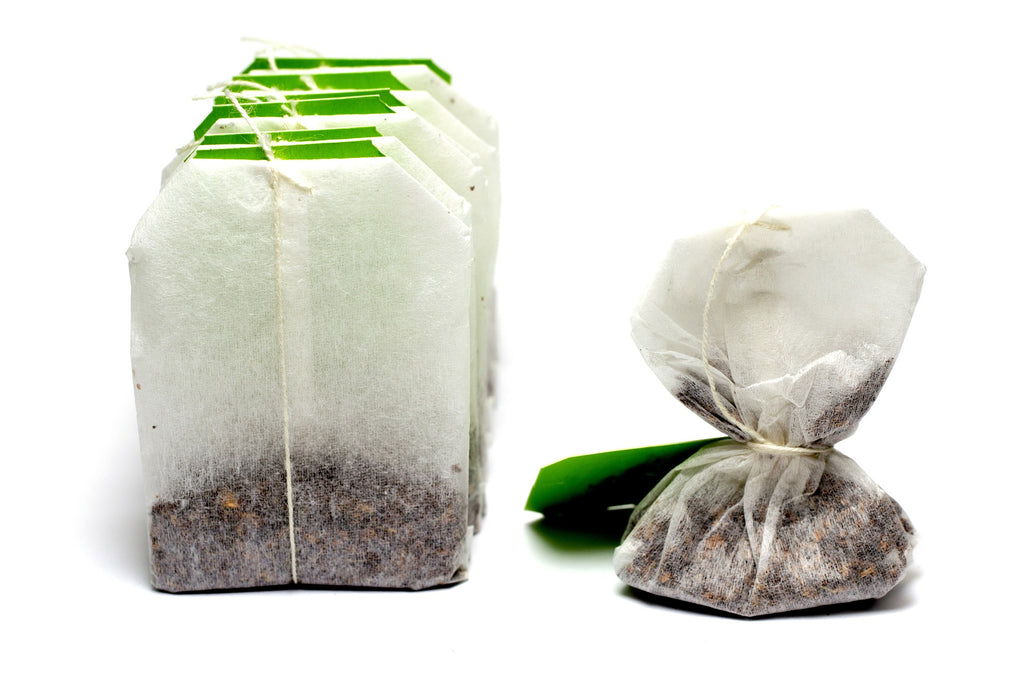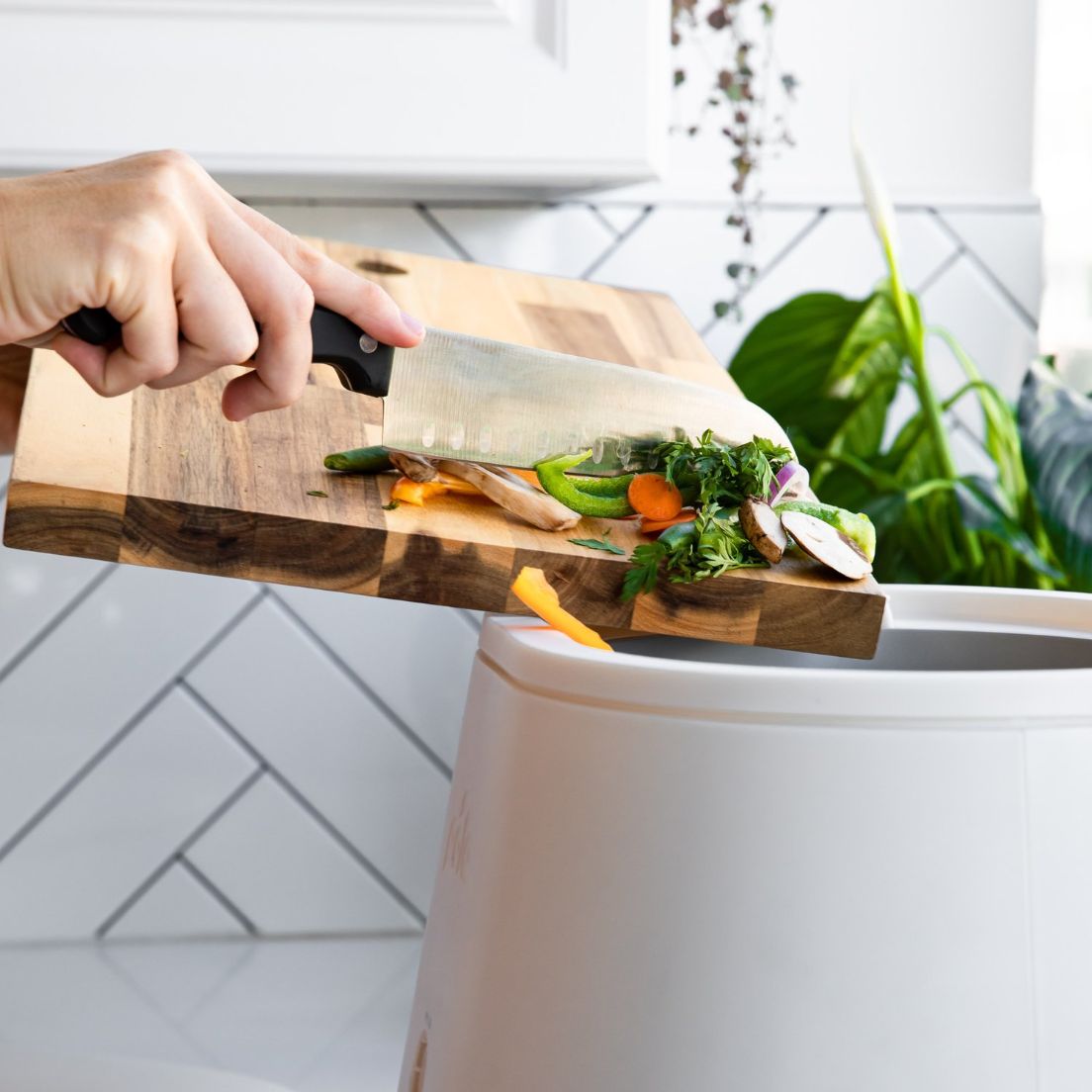
Tea bags can be made of a wide variety of materials and unfortunately some are not compostable.
Many commonly used tea bags can be composted but with a few caveats and notes to keep in mind to ensure the best possible results. Lomi makes it quick and easy to compost tea bags along with other food waste and get nutrient rich soil from your compost bin right in the comfort of your own home.
If you are wondering what other household items can be composted, you can find a comprehensive list of items that are compostable and not compostable items here!
Composting Tea Bags

It is common practice for many people today to enjoy a nice cup of coffee or tea on a daily basis. While the amount of waste may seem minor the wrappers, the bags, and the contents can add up over times, particularly if you and your family are drinking multiple cups of tea a day.
And families that brew large batches of hot or cold tea can use several of those jumbo-sized tea bags every week. Thankfully, tea is a wonderfully bridgeable product that can benefit plants of all kinds. The issue however, is the bags themselves and how compostable they are.
The answer to the question of “Can I put tea bags in my Lomi to compost into soil for my garden?” is yes, but with a few caveats and notes to keep in mind to ensure the best possible results. Moist tea leaves added to the compost bin increase the speed with which your pile decomposes so they are beneficial in that matter. However, the materials used in the tea bags themselves can have a large impact on how faster they break down and if they will compost at all.
What Are Tea Bags Made Of?

Tea bags are the small satchels and pouches that are made with permeable materials used for steeping teas. These material pouches are designed to keep loose leaf tea and herbs contained so they do simply float around in your cup. Yet they are made to be porous enough to allow hot water to filter through and turn your cut of plain hot water into delicious tea.
This process makes it easier to infuse the water with the fragrances and nutritional benefits of whatever is in the bags. Most commonly this includes things like herbs, flowers, tea leaves, and other additives that are blended to make all the various tea types you can find in stores today. Tea bags come in a range of shapes and sizes but they all are essentially the same as far as their purpose and basic design and use. Round tea bags, tea leaf blocks, and other forms can also be added to compost bins.
Tea bags have a range of materials that they can be fashioned out of and unfortunately, the majority of them are not designed to be easily composted- some are not made of biodegradable material at all! However, there still are some really good biodegradable options out there, so it's important to know what materials are used in tea bags and importantly, how to determine what your tea bags are made of in order to know if they are safe to add to a compost bin.
Consider the following when looking up what materials are used in your tea bags:
- The material used to make the tea bag itself
- Any materials that are added to keep the bag closed
- The blended infusion that goes inside the bag
- The attached strings, tags, and other parts of the bag
For tea bag materials and the other additional materials used, there are a variety of options for how each may be composed.
Differences Between Compostable and Not Compostable Tea Bags

When using tea bags in compost bins and containers, or if you are adding the directly to posted plants or garden soil, you will need to first attempt to identify if the bag itself is compostable. More than a quarter to a third of many tea bags may be composed of polypropylene. This is a synthetic material that closely resembles plastic and it is not biodegradable.
These types of tea bags may be slippery to the touch and have a heat-sealed edge. If your tea bags contain this or other chemical and synthetic products then they will not be safe to use for your composting and should simply be thrown in the trash.
Tea bags made of paper, silk, cotton, hemp, plant fibers, or muslin are suitable composting tea bags. There ae no harmful chemicals or plastics to contaminant the organic matter or to mess up compositing bins and containers. When using Lomi or similar products it is very important to use only these sorts of bags when composting scraps at home.
Are Tea Bags Made of Biodegradable Materials?

The following are the most common materials that are used to create tea bags:
Filter paper:Tea bags made with this material are largely comprised of organic pulp, like hemp, which is molded to form the shape of the tea bag and can fully be composted down after use.
Plastic:Some bagged teas has small levels of plastic or can be made entirely of special blends of plastics, which are not a biodegradable material and cannot be put in the compost pile.
Silk:While not as popular as it has been in the past due to rising costs, silk is still used in tea bags and is a biodegradable material and can be composted fairly easily.
Blends:Some tea bags are made with a mix of several products to get the right balance of porousness while ensuring the bags hold together during transport and use, so be mindful!
Consider the Sealing and Attachment Methods

No what materials are used, all tea bags must be sealed in some way to keep the bag shut and to prevent contents inside the bag from falling out while the tea is steeping. Some of these methods do not affect its biodegradability, but others make the bags tainted and thus not able to be put in the compost pile.
Methods and materials for sealing tea bags can include any of the following:
Folding:Some tea and stuck to itself with no glues or additives as a way that helps them closed. These types of bags are compostable.
Tying:Other tea bags use a cotton string to tie the bag shut. Cotton is organic which means they can be throw into the compost pile.
Glues:Many popular tea bags use glue for sealing bags which can contain polypropylene. It is biodegradable but takes far too long to compost.
Metal staples:Metal clips or staples are common as well. But they are easy enough to remove before composting the tea bags.
Making sure your used tea bags are safe for compositing will ensure a faster and easier process and will also help ensure you get rich organic soil that is safe for your plants and for you and your family.
How to Compost Tea Bags With Lomi

When composting tea bags with your Lomi home countertop compositing bin, it is important to remember the balance of items added into the composter. Tea bags can be composted but they will break down faster and generate better soil in the end if they are mixed in with other scraps and materials as well.
Incorporating food waste and scraps and other plant matter can help speed up the process and also help to break down the bags and string faster as well. Tea bags should be part of your Lomi composting experience, not the entirety of it.
After steeping your cup or pot of tea, add the cooled tea bags or leaves to your food waste bucket, or you can add them right into your Lomi container. When you have enough items and materials gathered to run your Lomi, simply finalize the additives and turn your composter on. Let it work its magic and your tea bags and everything else will be composted down for you quickly and easily.

It is also possible to simply put biodegradable tea bags and organic material directly into your potted plants to give them a boost of valuable nutrients and some additional organic matter. They can also help with moisture retention and ensure a more even watering for your potted plants. And while this is doable, it is always best to compost the tea bags down before adding them to plants or garden soil.
Tea bags that are good for compost bins may take months to decompose, and the speed depends on the materials used, the conditions of the composting bin, and other factors that can be difficult to monitor or control with outdoor composting bins. With Lomi, this is sped up greatly and most biodegradable tea bags will almost totally break down by the end of the longest composting cycle.
Composting tea bags is a wonderfully sustainable and green method of disposal and is a perfect example of recycling and keeping an eco-friendly outlook to daily personal habits. These tea bags are terrific for the health of all your plants and can be easily transformed, along with other common household scraps, into rich beautiful soil.
How to Compost Tea Leaves and New Tea Bags With Lomi

The actual components that go into making that tasty blend you love in the morning can be quite complicated. Even simply teas can have multiple ingredients in them.
There are many different mixtures composed of various plant parts as well. Herbal teas can have multiple plants and herbs and even spices added to the. And best of all, in pretty much any situation, the contents of the tea bag can be added to Lomi and used for composting at home.
In any given tea bag that you use for your morning, afternoon, or evening cup of tea, you are likely to find one or more of the following:
- Tea leaves - dried leaves of one or more tea plant varieties
- Tea buds - buddings parts of tea plant flowers can be added
- Flowers - blossoming such as rose, echinacea, and jasmine
- Roots - licorice, ginger, and marshmallow plant roots are common
- Stems - these plant parts can be cut up and added to bulk up a tea
- Herbs - other plants can be added to create different flavor profiles
- Spices - many spices are added to herbal teas to give unique flavors
- Fruits - dried fruits like apples, oranges, and cranberries can be used
- Misc. - other plant-based ingredients are also occasionally found in teas
Final Thought on Compost Safe Tea Bag Material

One of the most important things to remember, aside from ensuring your tea bags are bio-friendly and can be composted, is to not forget about the tea inside the bag itself. The ingredients and used tea leaves are typically all dried organic materials, which means the tea fillings are compostable even if the bag they come in is not. While not all tea bags are completely recyclable, many of the components used to make them can be.
So, for tea satchels that cannot be added to your Lomi, you can simply open the bag and compost the tea and herbs inside. While not as idea as composting the entire bag, reducing any garden waste and plant water and home waste is good and adding used tea leaves on their own can be a quick and easy way to add brown material to your composting batch to make to more balanced and nutrient rich.
With this Lomi composting tips, you can make the most of the tea lover in your home and turn those used tea bags and loose leaf tea remnants into rich healthy soil.
